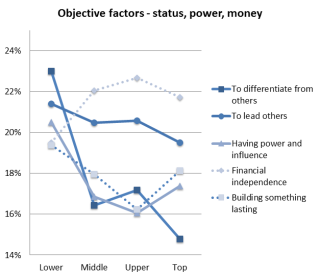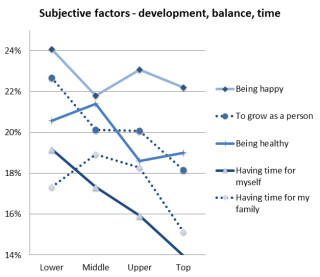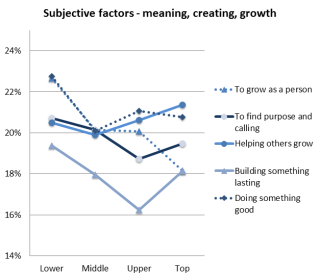How Your Fears Can be Your Compass for Growth
Leaving our comfort zone often requires accepting a certain loss of control going alongside with...
Nothing seems to be easier to answer than the question if you are successful. But the moment you start thinking about it, questions come up like “am I really successful?”, “what does successful mean?” or “successful in relationship to what?”. In a recent study with over 200 managers from all over the world I asked the question “What does long-lasting professional success mean for you?” I wanted to find out which ingredients are widely accepted in the recipe for success.
Success is subjective
In psychology, success is divided into objective and subjective aspects. Objective aspects are visible from the outside and are based on social norms and expectations. These include for example money, influence and status. In contrast, subjective aspects are more dependent on the values and beliefs of an individual. They include aspects such as self-realization and meaningfulness of one’s actions.
Facts, please
In the study for this book the participants were asked to identify their personal top 10 items from a list of 26 objective and subjective aspects of success. The results were quite interesting and differ remarkably across career levels.

The first thing that catches attention is the factor “To differentiate from others”. Obviously this aspect of success is key early on but of lesser importance as one is progressing through corporate hierarchy. The same applies for "Having power and influence". In contrast to the above the aspect of "financial independence" is of growing importance throughout a manager’s career. Together with "Being happy" these factors form the peak values across all levels as we shall see. "To lead others” plays a consistently important role at all levels. In senior management positions also the factor "Helping others grow" becomes more and more significant as can be seen in the next graph. “Building something lasting” is still very important for managers in the lower career levels. With growing career progress the importance decreases to come back up only in top management positions. This may be explained with the march through the courts which demands for many years of the manager’s conformity while executing strategies which have been defined by others. Only once they have reached “the top” they may feel the possibility and hence the importance of leaving their own footprint.
 It looks like idealistic aspects of success like “Doing something good” play a slightly larger role in lower career levels while remaining very relevant across all. It is also clear that the more abstract dimension "To find purpose and calling” decreases slightly with growing career progress while the more concrete dimension "Helping others grow” is seen as more relevant. Also the aspect "To grow as a person" decreases with increasing career progression, which may have to do with the fact that high-level executives often see themselves as "fully developed" despite the fact that some could do with some self-awareness and reflection. In contrast managers early in their careers often still have a stronger desire to improve their skills and in all fairness probably also a higher need to do so.
It looks like idealistic aspects of success like “Doing something good” play a slightly larger role in lower career levels while remaining very relevant across all. It is also clear that the more abstract dimension "To find purpose and calling” decreases slightly with growing career progress while the more concrete dimension "Helping others grow” is seen as more relevant. Also the aspect "To grow as a person" decreases with increasing career progression, which may have to do with the fact that high-level executives often see themselves as "fully developed" despite the fact that some could do with some self-awareness and reflection. In contrast managers early in their careers often still have a stronger desire to improve their skills and in all fairness probably also a higher need to do so.
 But what about the field of individual growth and good things like work-life balance? It looks like the importance of balance for success decreases significantly with ongoing career progression. Maybe this is because of the self-selection of the corporate system or because the need for balance is replaced by something else like finding one’s purpose in leading others and building something that lasts. It might also be that these are the visible effects of a generation gap between millennials and established corporate warriors. In any case the three factors “Being healthy”, “Having time for myself” and “Having time for my family” decrease significantly the higher the study participants get in the hierarchy.
But what about the field of individual growth and good things like work-life balance? It looks like the importance of balance for success decreases significantly with ongoing career progression. Maybe this is because of the self-selection of the corporate system or because the need for balance is replaced by something else like finding one’s purpose in leading others and building something that lasts. It might also be that these are the visible effects of a generation gap between millennials and established corporate warriors. In any case the three factors “Being healthy”, “Having time for myself” and “Having time for my family” decrease significantly the higher the study participants get in the hierarchy.
As mentioned before, also the factor “To grow as a person” is of decreasing significance when approaching top positions while the abstract desire for "Being happy" remains continuously important. All in all it looks as if happiness had different recipes on different career levels. While for senior managers it seems to be the result of “Helping others grow”, “Financial independence” and “Building something lasting” it has different ingredients in lower management. Here factors like “To differentiate from others”, “To grow as a person” and “Doing something good” seem to be of maximum importance.
Generally it can be noted that long-lasting professional success can be seen as the combination of subjective (individual) and objective (collective) factors which need to be present in the right mix. However, the different factors which need to be in balance change over time corresponding with the experiences that managers make throughout their careers.
What does this mean for you? What insights do you get when looking at the data? What is your definition of success and are you successful following your own definition? Looking forward to reading your thoughts.

Karsten is passionate about getting to the core of things in leadership coaching. His clients often describe him as an intuitive, empathic and at times challenging sparring partner who asks the right questions.
He helps his clients to look at issues from a different angle to reach their goals.
Karsten has an extensive international business and leadership background gained over 16 years.
He held leading positions at Accenture, Bombardier Transportation and Dell. In his last position as Managing Director for DELL's consulting business, he built up the field of business consulting in Europe.
Karsten is a Leadership Coach since 2006. He is accredited by the European Mentoring and Coaching Council (EMCC)and the World Economic Forum. He published several articles and books on the topics leadership, coaching and resilience. Furthermore, he is a certified psychotherapist (naturopath) and works as faculty at the Center for Responsible Leadership at WHU business school in Koblenz.

Leaving our comfort zone often requires accepting a certain loss of control going alongside with...

Did you know that by far the largest program to enhance resilience has been launched by the US Army...
Leave a Comment